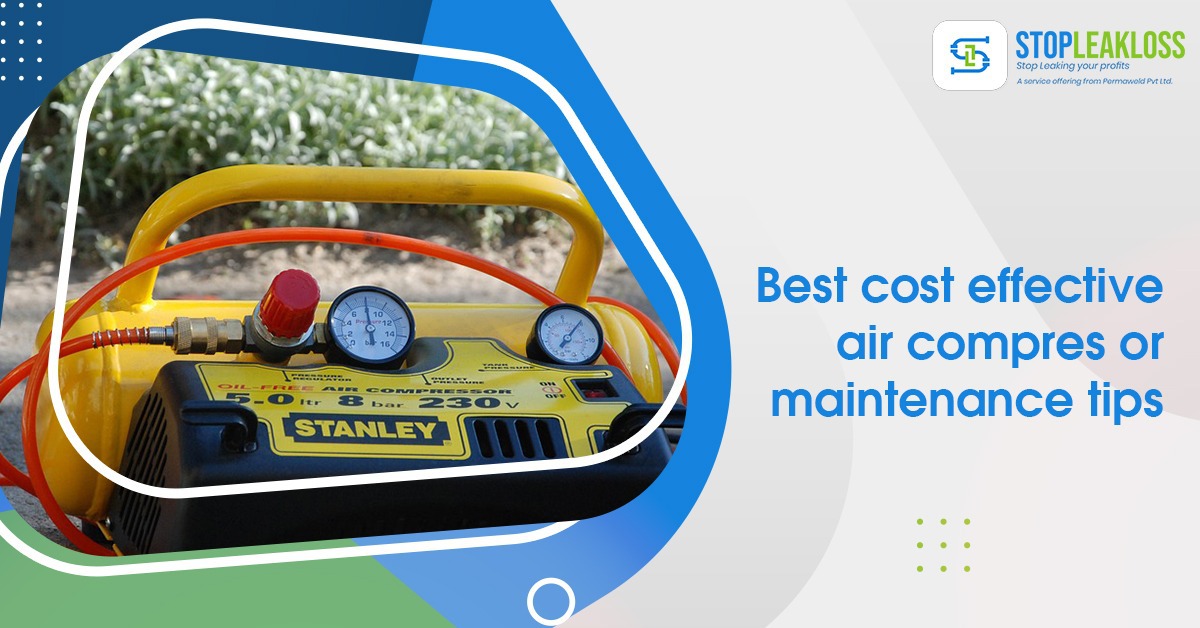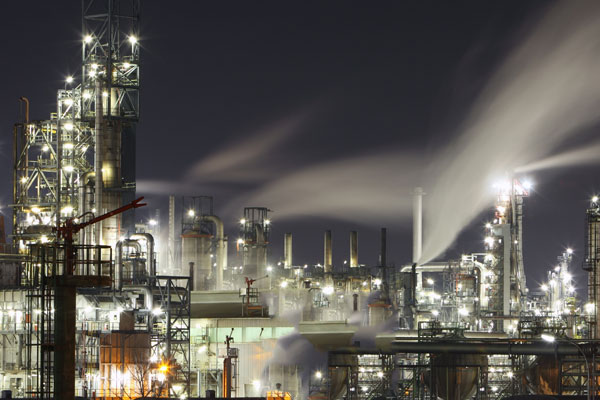
Best cost-effective air compressor maintenance tips
Air compressor maintenance tips- Knowing what variables diminish air compressor efficiency is the first step toward increasing it. An air compressor is a codependent system of controls and design that provides an efficient method. Let’s take a look at the five most prevalent causes of low air compressor efficiency, as well as how to fix them.
1. Make Good Use of Your Air Compressor Controls
An air compressor’s controls link the compressor’s output and the required load. Therefore, it is critical to match the rules to the machine’s capability. Compressors are designed to supply a specific volume of air at a particular range of pressure, and the controls govern their ability to stop when they reach that pressure range. In contrast, they define a minimum pressure when the compressor should be turned back on. Because persistent high pressure causes more strain on a system, it is better to have a fine-tuned control system that can supply steady, usable pressure closer to the minimum required rather than the maximum. (air compressor maintenance tips)
- Start and stop controls: These tell the compressor’s system when to turn on and off based on the desired pressure.
- Load/unload controls: These act in tandem with a start and stop controls to inform the compressor when to release pressure.
- Modulating controls: A compressor’s demands, such as flow, must be monitored, and modulating controls allow the user to alter this parameter. On the other hand, multi-step controls allow for operation without a full pressure load. (air compressor maintenance tips)
- Dual and auto dual controls allow the user to choose between the start and stop or load and unload switches.
- Variable displacement: This setting allows the compressor to operate under various partial load scenarios.
- Variable speed drive: This control generates a power output continuum in the motor, eliminating quantized output and allowing the engine to satisfy a wide range of demands.
- Controls for the master system: An all-around set of air compressor controls provides the operator with a more simplified ability to boost the device’s efficiency. System master controls are important for more complicated systems where localized controls are insufficient to handle the system. A solid set of system master controls can even give analytics and trends to adjust the system. (air compressor maintenance tips)
2. Improve the Overall System Design
One of the most important things in making an air compressor function efficiently is its design.
Here are some pointers for optimizing your system’s design and increasing the efficiency of your air compressor:
- The distribution system should be adequately sized. The compressed air distribution system’s size and composition might be essential in guaranteeing optimum flow and pressure delivery to the most remote point-of-use sites. Using a smooth, non-corroding material, such as Teseo’s Aluminum Piping, also helps to ensure appropriate flow and pressure delivery. If future growth is predicted, oversizing the distribution system will save thousands of dollars afterwards.
- Reduce the number of curves and angles in the flow route. Sharp twists increase the amount of friction in compressed air, causing it to heat up and wear on components. This heat generation depletes the system’s energy and causes more significant pressure decreases, resulting in a lower pressure upon delivery. The system will use less energy and last longer by straightening the flow channel.(air compressor maintenance tips)
3, Examine Your System’s Requirements
Air compressors are frequently mismatched and under-tuned for the genuine demands of their power devices.
Here are a few things you can do to make sure your system isn’t squandering energy:
- Reduce the extra pressure in your system. For example, a procedure requiring only 60 psi to operate may require 100 psi from an air compressor. This surplus air eventually goes unused since the regulator prevents it from harming the equipment and is expelled after the usage period. Match your system’s pressure to the pressure required by your gadgets.(air compressor maintenance tips)
- Calculate all of the demands imposed on your compressor. Add up the maximum pressure load required by each device if your air compressor powers numerous devices. This calculator will tell you what size air compressor you’ll need based on your needs. (air compressor maintenance tips)
- Air storage tanks can help your system. Extra air storage is useful in applications where several devices contribute to “peaking” times — that is, periods when the compressor struggles to keep up with demand. These tanks act as air reservoirs.
- Understand the load profile of your system. A compressed air system may have to fulfil varying amounts of demand within a particular period, and it must be able to work efficiently at high and low loads. For managing more complicated load profiles, it is sometimes desirable to use several compressors or compressors equipped with variable speed of frequency drives.(air compressor maintenance tips)
4. Reduced Pressure Drop
Pressure drops happen for various reasons, but reducing the origins of them is one of the best presents you can offer your air compressor system.
Here are some suggestions for reducing pressure drops:
- Use suitable pipe sizes: Inefficiency occurs when pipes between distribution heads and equipment are not adequately proportioned. Check that your pipe can manage maximum flow rates, not just average flow rates.
- Reduce moisture: Moisture causes condensation, which causes rust, which causes leakage and increases flow resistance. To keep moisture out of your system, change the air filters and maintain the drying equipment. (air compressor maintenance tips)
- Keep filters clean: When dirt clogs air filters, it is more difficult for the system to suck air inside and push it downstream. This scenario causes pressure decreases. It is, however, easily avoided by keeping a timetable for a filter change.
- Aim for low pressure drops: When selecting products such as dryers, separators, filters, regulators, lubricators, hoses, connectors, or aftercoolers, choose those with the lowest possible pressure drop. ( air compressor maintenance tips)
- Streamline the airflow path: The greater the distance air must go, the more likely it will be lost. Design your system to transport air the shortest distance feasible.
With the techniques outlined above, you should anticipate an immediate and significant improvement in the efficiency of your air compressor.
5. Maintain a Consistent Maintenance Schedule:
The most important tool for increasing long-term air compressor efficiency is to set regular air compressor maintenance dates. It is vital to keep your machine tuned due to the quantity of moving components, the continual inflow of air, and the intensive usage that it receives. Otherwise, issues such as condensation and unclean filters may wear down your system, increasing maintenance costs. (air compressor maintenance tips)
The primary goal of maintenance work should be to locate leaks. Leaks cause the great majority of air loss and efficiency issues. Even a little one can waste a lot of energy in an air compressor, (air compressor maintenance tips) placing extra pressure on the motor and leading it to wear out prematurely. The consequent decrease in air pressure makes tools work harder and requires more time to do the same task.




[…] first step in preventing losses from compressed air leaks is to determine the source of the problem and then take corrective action. Unfortunately, […]
[…] for energy transition 2, 3.The RT2012 now demands construction or renovation to have insulation and insulation indices and high sealing and low humidity. These indexes differ by region (climate, height). […]
[…] What boosts the energy efficiency of an air compressor? All elements to consider are type, model, size, motor power rating system design, control methods used, and maintenance schedule. However, the heat loss generated by the higher temperature of pressured air and friction caused by the system’s many moving elements is the main cause of inefficient air compression. (Air Compressor Efficiency) […]